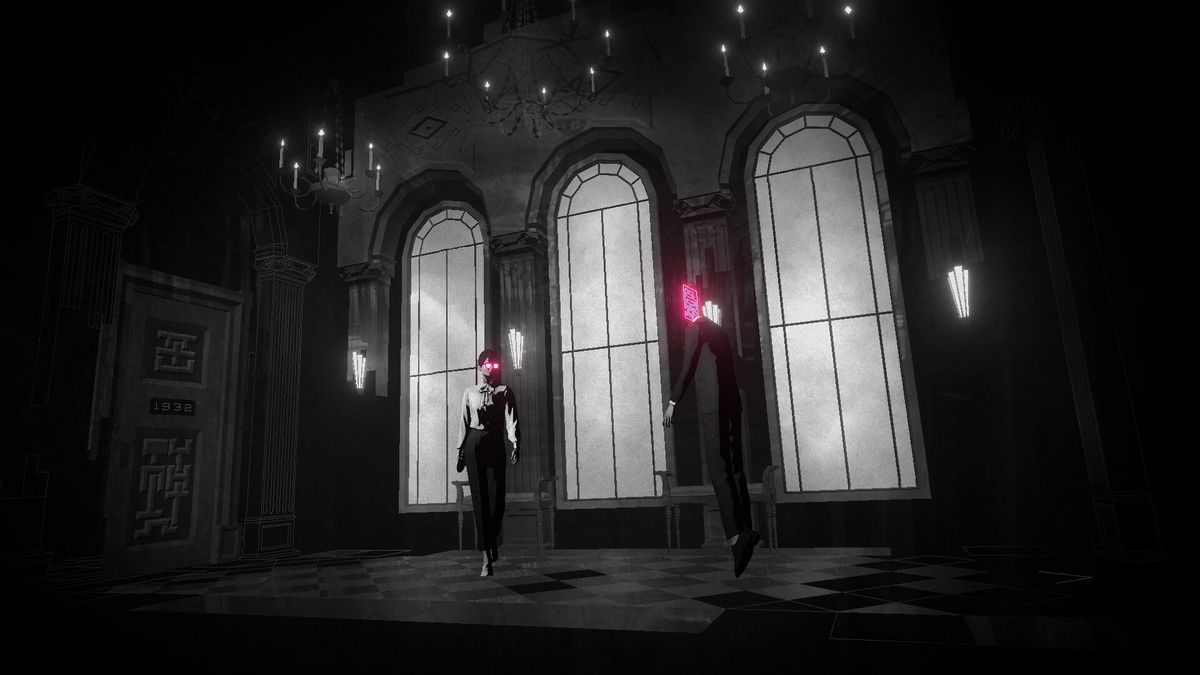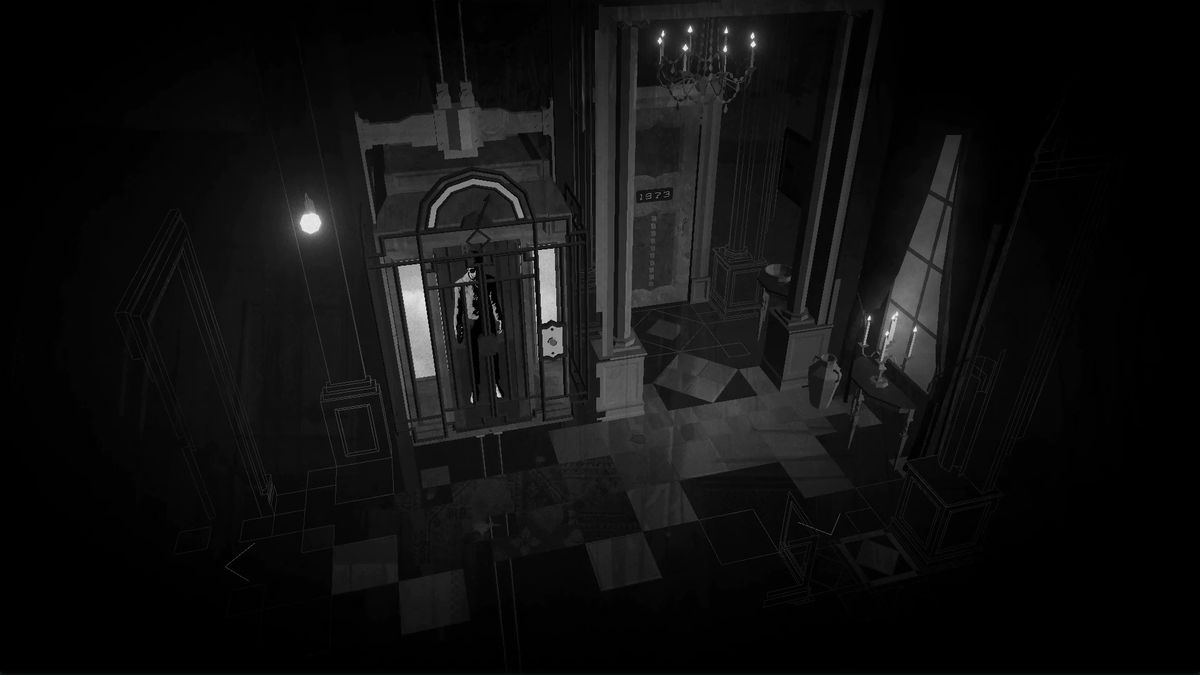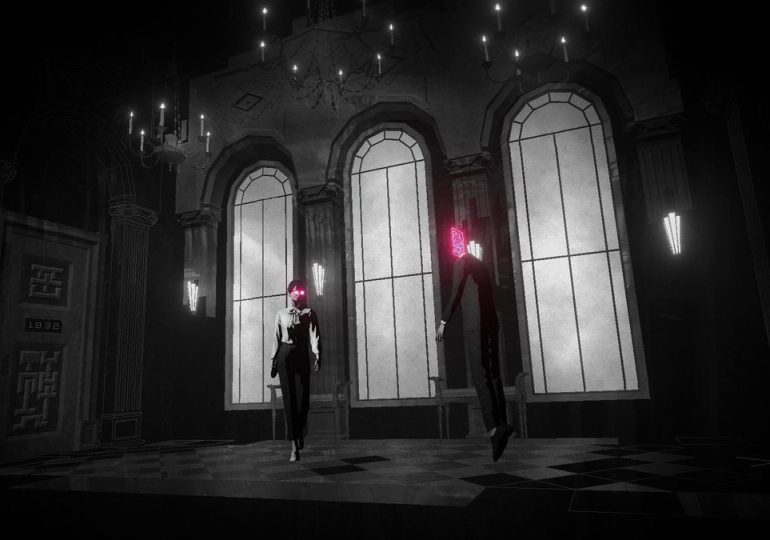Several puzzles in Lorelei and the Laser Eyes made me wonder: What sort of sickos does it take to create this kind of game? The answer is the developers at Simogo, the Swedish studio known for pop rhythm game Sayonara Wild Hearts and puzzle games Device 6 and SPL-T. This new Simogo game pulls together different realities, layers of logic puzzles, math, and a distinct, undeniable ambiance. Everything is a puzzle in Lorelei and the Laser Eyes — even the story itself — and nothing is exactly as it seems.
Lorelei and the Laser Eyes begins with the player character Lorelei arriving at an old mansion-turned-hotel deep in an Italian forest. There she meets an absolute weirdo who wouldn’t be out of place in shows like Twin Peaks or The X-Files. The puzzles begin as soon as she arrives; there’s very little actual instruction, but hints everywhere. It’s not entirely clear why you’re there or what you’re supposed to do, but there are a lot of locked doors and mysterious document tubes, and that seems like a good place to start. The document tubes lay out a map of the mansion, and you know what doors do. As you open new doors and discover new things, some sort of picture will start to take shape. You may not yet learn what’s going on, but you’ll know what you have to do to move forward.

Simogo previously said there were more than 150 puzzles spread across the environment in Lorelei and the Laser Eyes, and you can feel that depth. So many of the puzzles build off one another, letting the player learn the logic in play before pushing that logic into a new place. The answers are everywhere: in the environment itself, or in dozens of papers, books, and scripts you’ll pick up and read. There are word problems, math problems, shape puzzles, visualization exercises, and video game mazes. Some things you’ll see won’t make any sense at all — say, a lady with glowing eyes comatose in a bed — until the very moment it clicks, be it due to something you heard over the airwaves or a note tucked into a hidden book.
It’s the sort of game that needs a notebook and pen at hand; Simogo will actually provide you with this directive in a Lorelei and the Laser Eyes instruction manual found early on in the game. Twenty-five hours into Lorelei and the Laser Eyes, I’ve got dozens of pages of madman scribbles, notes that would look like nonsense to anyone but me. Some of the puzzles I worked on for hours without even opening the game itself. On one particularly hard (and optional) puzzle that required no knowledge of the game itself, I asked my sister for help. Days later, she sent me a photo of the answer, scrawled out on a work-branded Post-It note. When we got the answer, it seemed so, so obvious. Simogo has really found the recipe for making you feel so dumb, and just as quickly, the most brilliant woman on Earth.

I’m 25 hours into Lorelei and the Laser Eyes, and according to the in-game percentage meter, over 80% complete. I’m in so deep now that discussing puzzle logic with a fellow critic — who was essential in solving some of the hardest puzzles for me — would sound to anyone else like we’re speaking a different language. Even with the game closed, I’m still thinking about what’s left: a bunch of puzzle boxes that open with what feels like incomprehensible codes. I’m looking for the logic, patterns to analyze — drawing out figures in my notebook — and I don’t want to stop.
It can be very easy for a puzzle game as complex as Lorelei and the Laser Eyes to get frustrating, and I’ve certainly felt that a bunch. But it’s never pushed me past that point and made me quit. Despite its madness, I know the logic’s there. I’ve just got to find the right perspective. Lorelei and the Laser Eyes may have broken my brain, but somehow, it has then rebuilt my brain into something even stronger.
Lorelei and the Laser Eyes will be released May 16 on Nintendo Switch and Windows PC. The game was reviewed on PC via Steam Deck using a pre-release download code provided by Annapurna Interactive. Vox Media has affiliate partnerships. These do not influence editorial content, though Vox Media may earn commissions for products purchased via affiliate links. You can find additional information about Polygon’s ethics policy here.








